Please activate JavaScript in your browser to use all interface options.
Igor Sechin Presents Keynote Speech at SPIEF-2025 Energy Panel
21 June 2025-350x1000.jpg)
As part of the XXVIII St. Petersburg International Economic Forum, an Energy Panel organized with the support of Rosneft was held. Igor Sechin, Chief Executive Officer of the Company, presented the keynote speech "Odyssey Of The Global Economy In Search Of The Golden Fleece. The New Landscape Of Global Energy".
The head of Rosneft presented a detailed analysis of the current situation on the energy market.
Special attention in the report was paid to the overdue transformation of the global energy sector. The development of high technologies requires a significant amount of natural resources, including energy resources. Training and use of artificial intelligence on the basis of large data processing centers is a highly energy-intensive process.
Igor Sechin noted in his report that our civilization is at a critical juncture - the global energy industry is facing a large-scale transformation and the energy consumption model is changing. Against this backdrop, every country is facing the issue of the need to ensure energy security.
Huge investments made in recent years to develop alternative energy sources have not yielded tangible results. Moreover, the inclusion of renewable energy sources in the energy systems of a number of countries has reduced reliability and even caused large-scale blackouts.
The Energy Panel at SPIEF also brought together heads of major energy companies and leading market experts to discuss the prospects and new vectors of global energy development in the emerging multipolar world.
The event was also attended by Mohammed Bin Saleh Al-Sada, Chairman of Rosneft's Board of Directors, Delcy Rodriguez, Executive Vice President of the Republic of Venezuela, Zhang Daowei, Vice President of CNPC, Panda Madhusudana Shiva Prasad, Executive Director of Reliance Industries, Simon Aloysius Mantiri, Chief Executive Officer of Pertamina, Alexander Dynkin, Academician of the Russian Academy of Sciences, Zhurabek Mirzamakhmudov, Minister of Energy of the Republic of Uzbekistan, Zhurabek Mirzamakhmudov, Chairman of the Supervisory Board of the Japanese Government's non-profit initiative for the development of a new oil and gas industry in the Republic of Uzbekistan, and the Chairman of the Supervisory Board of the Japanese Government's non-profit initiative for the development of a new oil and gas industry.
The Energy Panel was moderated by Rick Sanchez, a renowned American journalist and host of the RT TV channel.
THE NEW FACE OF GLOBAL ENERGY
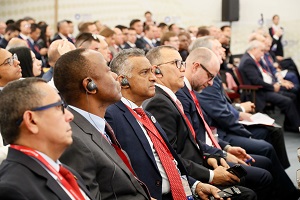 The current state of the global energy industry is at the stage of forming a new image due to the multiple growth of electricity consumption, the generation of which will be provided by both fossil fuels and renewable sources, said the head of Rosneft. In his report, Igor Sechin described the main factors influencing the change in this image, including: the need to ensure energy security and commercial efficiency of energy sources, budget deficit and avalanche growth of public debt, as well as the demography of developing countries.
The current state of the global energy industry is at the stage of forming a new image due to the multiple growth of electricity consumption, the generation of which will be provided by both fossil fuels and renewable sources, said the head of Rosneft. In his report, Igor Sechin described the main factors influencing the change in this image, including: the need to ensure energy security and commercial efficiency of energy sources, budget deficit and avalanche growth of public debt, as well as the demography of developing countries.
Another factor that, according to the head of Rosneft, affects both energy production and consumption growth is the digital revolution with the application of artificial intelligence and work with big data.
The electric power sector will have a special role to play, as it will have to overcome the risk of shortages due to the surge in consumption growth in China, India, developing countries and the huge need for electricity to supply data centers and heavy industry. According to Sechin, already today the level of electricity generation in China is more than twice as high as in the U.S., whereas 20 years ago the situation was the opposite.
In his opinion, investments in this sector will exceed investments in fossil fuels by 50% as early as 2025. " Indeed, over the past 15 years, electricity consumption has grown at a faster pace, and according to IEA projections, electricity generation is set to nearly double over the next 25 years," Igor Sechin added.
At the same time, the largest contribution to this growth will also be made by the countries of the Asia-Pacific region, which will provide 60% of the consumption growth. "This trend is particularly evident in India, where peak demand on the power system has risen by nearly 70% over the past decade," said the head of Rosneft.
In his report, Igor Sechin quoted Vaclav Smil, one of the most respected scientists of our time and a proponent of a realistic approach to the transition to new energy sources: "Energy is the universal currency. One of its many forms must be transformed to get anything done.”
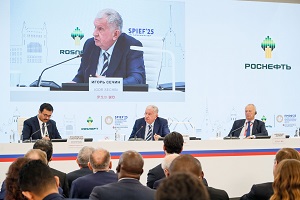 The head of Rosneft noted that modern societies with high energy consumption prefer to use resources with the highest useful energy yield, primarily fossil fuels.
The head of Rosneft noted that modern societies with high energy consumption prefer to use resources with the highest useful energy yield, primarily fossil fuels.
"Those who can actually take part in shaping the new energy landscape will have the opportunity to achieve advanced economic and technological growth. This brings to mind the legend of the search for the Golden Fleece by the Argonauts who overcame enormous hurdles and troubles on the way to achieving happiness and prosperity," Igor Sechin said.
The synthesis of conventional and alternative energy sources is currently the optimal solution for the development of the global energy sector, the head of Rosneft is convinced.
Igor Sechin emphasized that the search for new energy sources never stops, and today there is active work on the development of a number of promising technologies. However, their full-fledged implementation is still a long way off, as current technological solutions in this area are too expensive and inferior to traditional energy sources in terms of a number of parameters.
CHINA: SMART APPROACH AND ENERGY INDEPENDENCE
Igor Sechin noted that China is a unique example of a competent approach to the development of the energy system - the country now accounts for a third of global investments in the energy sector.
"In my opinion, China, which has already ensured its energy security, is confidently moving towards complete energy independence, forming a stable energy balance based on its own resources. There is no doubt, taking into account the persistence and professionalism of the Chinese comrades, that in the foreseeable future they will achieve the desired result, which will turn China from an importer of energy resources into a major energy exporter," Rosneft CEO said.
In recent years, China has been commissioning the largest amount of new renewable energy capacity and is home to more than 70% of the world's green economy equipment manufacturing capacity. This applies to the entire value chain: from critical minerals to the production of high-tech equipment that has no analogues in Western countries, Sechin emphasized.
The head of Rosneft also noted China's efforts in increasing investments in related infrastructure: investments in power grids increased by 15% last year and may double this year.
At the same time, China has never abandoned fossil fuels. The country has outpaced the rest of the world in terms of commissioning new coal-fired generation capacity over the past five years. "Today, coal accounts for almost 60% of China's electricity generation. Last year alone, China issued permits for about 100 gigawatts of new coal-fired power generation , the highest in a decade, which should strengthen coal's role in the grid," the Rosneft head emphasized.
Igor Sechin noted that an important part of the strategy to reduce dependence on energy imports is the processing of coal into synthetic fuels and chemical products.
"Chinese companies are investing billions of dollars in the development of this industry. According to experts, today in China 40 million tons of coal is used to produce synthetic fuels and more than 260 mln tons for ammonia and methanol production," Igor Sechin stressed.
ROSNEFT SYNTHETIC OIL
Rosneft has completed the development of proprietary technologies and catalysts throughout the entire chain of the GTL process and plans to introduce this technology in Taimyr, Igor Sechin said. He added that all stages of the technological process are covered by relevant patents.
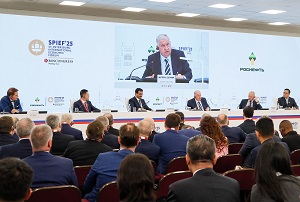 The head of the Company demonstrated to the participants of the energy panel a flask with the obtained fuel, noting that it is synthetic oil consisting of the purest hydrocarbon molecules with zero sulfur content.
The head of the Company demonstrated to the participants of the energy panel a flask with the obtained fuel, noting that it is synthetic oil consisting of the purest hydrocarbon molecules with zero sulfur content.
"To anyone who is interested, we are ready to provide samples," he added, addressing the participants and audience of the Energy Panel.
NUCLEAR RENAISSANCE
The importance of nuclear power, which is a natural complement to fossil fuels, is growing, Igor Sechin noted.
A few years ago, the nuclear power industry was in a deep crisis due to the decline in activity in the industry. However, then the situation started to change. "Over the past five years, global annual investments in nuclear energy have increased by 50%, reaching 70 billion dollars last year . China has become one of the leaders in nuclear power today. Over the past ten years, the installed capacity of nuclear generation in this country has increased fivefold and approached 60 GW. China plans to complete the construction of 32 more reactors in the coming years," said Rosneft's head.
At the same time, Sechin called it important that China relies on the latest technological achievements of the leading nuclear powers - Russia, the United States and France - to develop its nuclear industry.
He noted that Russia has many years of experience in building nuclear power plants. The cost of the most modern Russian VVER-1200 reactor is significantly lower than that of the American AP-1000. Today, such reactors are already operating in Russia and are planned to be commissioned in friendly countries.
"Today, Russia is the only country in the world that has expertise in the entire technological chain of the nuclear fuel cycle, from uranium mining to nuclear fuel disposal. In total, 80 nuclear reactors have been built in the world using Russian technologies," Igor Sechin said.
Also, a sodium-cooled nuclear reactor belonging to the category of fast neutron reactors, the BN-800, has been successfully operating in our country for ten years, another latest-generation fast neutron reactor, the BN-1200, is under construction.
The head of Rosneft expects further growth of investments in the nuclear sector: new technologies, such as small modular reactors, are now attracting increased attention from investors. While such reactors are more mobile, their implementation also requires investments in the development of power grids. In addition, special attention should be paid to their safety and security against terrorist threats.
ENERGY - DRIVING FORCE OF THE NEW TECHNOLOGICAL REVOLUTION
The energy sector is one of the main drivers of the new technological revolution, Igor Sechin believes.
He noted that the digital revolution with the application of artificial intelligence and work with big data should become the basis for labor productivity growth. According to the assessment of investment bank Goldman Sachs, large-scale implementation of high technologies will increase labor productivity by 1.5 p.p. for developed countries and by 1 p.p. for developing countries within 10 years.
"The development of advanced technologies requires substantial natural resources, as well as large-scale investments in infrastructure and human capital. This, in turn, means a multiple increase in energy consumption," Rosneft CEO noted.
He recalled that the use of artificial intelligence on the basis of big data processing centers is a highly energy-intensive process. Such centers, according to Sechin, will contribute more to the growth of global electricity demand than heavy industry or heat supply.
Igor Sechin also cited the development of the cryptocurrency market as an example of the impact of digitalization on the global energy system. According to him, in less than ten years, cryptocurrency has become an independent industry that today consumes resources on a par with entire countries. For example, the energy consumption of the entire bitcoin network as of May 2025 has already exceeded the level of electricity consumption in Poland.
"GREEN" TRANSITION TO REGRESSION
Proponents of the "net zero" concept are leading mankind to energy regression, Igor Sechin believes.
He recalled that whenever mankind switched to a new type of fuel, the efficiency of the energy system increased and its capabilities expanded. "This was due to the fact that the new energy source usually had a higher energy flux density," the Rosneft head explained.
Eminent scientist Pyotr Kapitsa proved - energy flow density is a key characteristic of any kind of energy. "By this indicator, such types of fossil fuels as coal (135.1 W/m2), oil (195 W/m2) and gas (482 W/m2), as well as nuclear energy (241 W/m2) are far ahead of both solar (6.6 W/m2) and wind energy (1.8 W/m2) . Thus, the concept of ‘net zero’ actually crosses out centuries of progressive development of society, offering mankind an energy regression," said the head of Rosneft.
At the same time, European politicians do not have the courage to publicly recognize this fact. "Their blind faith in the ‘green’ transition already resembles an addiction. As one of the classics of French literature aptly put: ‘A red nose is a sign of constancy of character’," Igor Sechin emphasized. The ill-considered strategy of abandoning conventional generation has already resulted in the fact that the cost of electricity in Europe today is five times higher than in the US, he added.
Sechin also reminded that the European Union continues to try to push through the reduction of the price cap on Russian oil to 45 dollars per barrel.
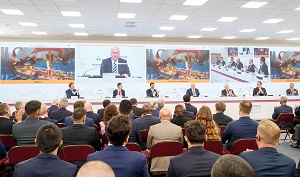 "I believe that the real purpose of this is the EU’s desire to increase the efficiency of its purchasing from Russia, not to reduce Russian budget revenues, as was publicly declared. Figures confirm this: according to Western experts, since the beginning of 2023, Europe has purchased more than 20 billion euros worth of Russian oil, thus becoming the fourth largest buyer," Sechin said.
"I believe that the real purpose of this is the EU’s desire to increase the efficiency of its purchasing from Russia, not to reduce Russian budget revenues, as was publicly declared. Figures confirm this: according to Western experts, since the beginning of 2023, Europe has purchased more than 20 billion euros worth of Russian oil, thus becoming the fourth largest buyer," Sechin said.
However, he thinks it is clear that the U.S. will not agree to lower the price cap because it would negatively affect the profitability of U.S. oil exports.
THE DECLINE OF THE WEST
Igor Sechin noted that interest payments on the U.S. government debt divert significant budgetary resources. He reminded that the predicament in which developed countries find themselves due to the growth of government debt is already reflected in the assessment of their creditworthiness. Thus, in May, Moody's became the last of the three leading international rating agencies to strip the US of its highest credit rating.
The Rosneft head explained that with the growing deficit, interest payments divert significant budget resources from social and defense spheres. "Last year, net interest payments on the national debt reached a trillion dollars, which accounted for 14% of all state budget expenditures, exceeded defense spending and is already approaching the amount of healthcare spending," Sechin said.
The head of Rosneft also recalled on history and gave an example of how great powers come to decline due to excessively high levels of government debt. " By the late 18th century, French rulers had experienced firsthand how a fiscal guillotine could swiftly transform into a literal one," Igor Sechin noted.
By that time, France had accumulated so much debt that it took more than half of all government expenditures to service it, which led to an increase in taxes. According to the Rosneft CEO, this was one of the main reasons for the Great French Revolution, which, in essence, ensured the transition from a monarchy to a bourgeois parliamentary republic.
INDUSTRY LEADERS
The Energy Panel of the XXVIII St. Petersburg International Economic Forum continued with presentations by leading industry experts, politicians, scientists, government officials and heads of major international energy companies.
Their assessments and forecasts largely coincided with the industry development concept presented by Igor Sechin, head of Rosneft.
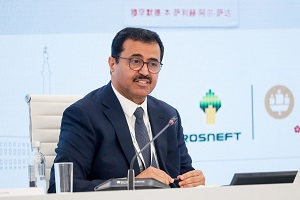 Mohammed Bin Saleh Al-Sada, Chairman of Rosneft's Board of Directors, opened the discussion of Igor Sechin's report, noting the depth of his analysis. "It was comprehensive - the way you showed that progress and energy are inseparable," Al-Sada addressed Sechin.
Mohammed Bin Saleh Al-Sada, Chairman of Rosneft's Board of Directors, opened the discussion of Igor Sechin's report, noting the depth of his analysis. "It was comprehensive - the way you showed that progress and energy are inseparable," Al-Sada addressed Sechin.
The head of Rosneft's Board of Directors drew the audience's attention to the fact that despite the active promotion of the idea of transition to renewable energy sources, the share of fossil energy sources in the energy mix has not changed in recent decades. He recalled that Igor Sechin mentioned in his report that fossil fuels account for 80% of the global energy balance.
"I would also like to take as a baton from Mr. Sechin, and pass my comment to you. It's like food for thought: are we really moving from fossil fuels to renewable fuels?"," Al-Sada addressed the audience.
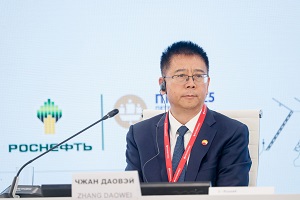 Zhang Daowei, Vice President of China's CNPC, noted that he listened with interest to the report of Rosneft's CEO. In his speech, the top manager of the Chinese company expressed similar assessments of the ways of global energy development, in particular, the need for synergy between traditional and new energy sources.
Zhang Daowei, Vice President of China's CNPC, noted that he listened with interest to the report of Rosneft's CEO. In his speech, the top manager of the Chinese company expressed similar assessments of the ways of global energy development, in particular, the need for synergy between traditional and new energy sources.
According to the vice president, CNPC, on the one hand, continues to increase the exploration and development of oil and gas fields domestically and import high-quality resources from abroad, including strengthening long-term cooperation with Russia in hydrocarbon trade. On the other hand, CNPC is actively pursuing a "green" strategy, low-carbon development and realizing the development of a "three-step strategy" combining oil and gas projects with wind, solar, geothermal, hydrogen and carbon capture technologies.
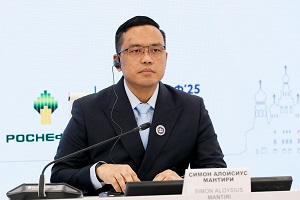 Simon Aloysius Mantiri, President and CEO of Pertamina Indonesia, said the company is pursuing a dual growth strategy that is based on both conventional resources and low-carbon solutions. At the same time, natural gas plays an important role in the country's energy mix.
Simon Aloysius Mantiri, President and CEO of Pertamina Indonesia, said the company is pursuing a dual growth strategy that is based on both conventional resources and low-carbon solutions. At the same time, natural gas plays an important role in the country's energy mix.
The head of Pertamina doubled down on the thesis of Igor Sechin's report and emphasized that by achieving a balance of energy sources and a comprehensive approach, the company is able to ensure high rates of economic growth and, in parallel, carbon neutrality.
Reliance Industries executive director P.M.S. Prasad said India is not choosing between energy access and innovation. "India is integrating both. By developing scalable, context-specific solutions, India is addressing local priorities while making a significant contribution to global sustainability. From rural microgrids to energy efficient data centers, India is turning its potential into a strategic asset," Prasad said.
He also emphasized the significant role of nuclear power generation in the country's energy balance and spoke about plans to build nuclear power plants in India, including modular ones.
The renewed interest in investments in NPP construction was noted in the speech of the Minister of Energy of Uzbekistan Zhurabek Mirzamakhmudov. He told about joint plans with Russia to build two units of 55 megawatts each, and two units of WWR type reactors - water-water energetic reactor. The head of the ministry also said that gas-fired power plants are being installed in the country , hydropower is being developed, the share of renewable sources is increasing, and storage systems are being created at the same time.
The Minister noted the substantial nature of Igor Sechin's report, which contains a detailed analysis and reflects all trends in the development of global energy, science and economy.
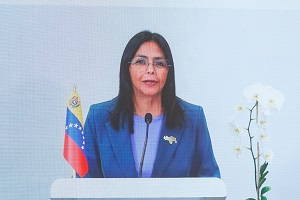 In her speech, Delcy Rodriguez, Executive Vice President of the Republic of Venezuela, supported the thesis expressed by the Head of Rosneft that energy security issues should come first and named the main components of a stable energy system of the future: energy security, reliable supplies, accessibility for all, and at the same time respect for nature - with minimal environmental impact.
In her speech, Delcy Rodriguez, Executive Vice President of the Republic of Venezuela, supported the thesis expressed by the Head of Rosneft that energy security issues should come first and named the main components of a stable energy system of the future: energy security, reliable supplies, accessibility for all, and at the same time respect for nature - with minimal environmental impact.
Speaking about the main threats to energy security, Rodriguez supported Igor Sechin's assessment: illegal sanctions against producing countries and the hegemony of the dollar are the main threats.
Nobuo Tanaka, Chairman of the Supervisory Board of the Japanese government's non-profit Low Carbon Technology Initiative, for his part, said that the answer to energy security is always related to diversifying sources of supply, improving energy efficiency and seeking alternative energy sources, including renewable energy, nuclear energy and regulating the market through predictable policies.
Igor Sechin's thesis that the digital revolution opens a new era in the development of the oil and gas industry was warmly echoed by the audience. In particular, David Gadzhimirzaev, General Director of TOFS Oilfield Services Group, thanked Rosneft for supporting innovation and technology development. He emphasized the importance of ensuring the availability, stability and reliability of resources, which is exactly what new technologies that will reduce the cost of bringing barrels to the surface can provide.
REPORT OF THE CHIEF EXECUTIVE OFFICER OF ROSNEFT I.I. SECHIN AT THE SPIEF ENERGY PANEL
PRESENTATION OF I.I. SECHIN`S REPORT AT THE SPIEF ENERGY PANEL
Department of Information and Advertising
Rosneft Oil Company
June 21, 2025

-315xx70.png)

